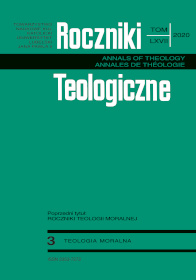Continuing the Thought Humanae vitae in the Post- -synodal Adhortation Amoris laetitia or a New Interpretation of Morality?
Abstract
50 years after the publication of the encyclical Humanae vitae, there was a demand to read it again in the light of the method proposed by Pope Francis in the exhortation Amoris laetitia. The new reading of the teachings of Pope Paul VI should take into account a new perspective: not from moral norms, but from the description of the reality in which the spouses find themselves. This new reading optics of Humanae vitae outlined in Amoris laetitia raises the question: is the teaching of Pope Francis a continuation or a new interpretation of morality? There are clear differences in taking such issues as: the essence of sin, its horizontal and vertical dimension, the existence of internally evil acts. Contrary to Paul VI, Francis takes the question of conscience and its role in moral choices. It is hard to resist the impression that the concept of creative conscience, definitely rejected by John Paul II, appears in the moral justifications of Pope Francis. We can also come across fragments of Pope Francis' exhortation, which may prove that he was on the side of the concept of the gradation of law, also rejected in the teaching of the Church so far. Various ways of interpreting certain aspects of moral teaching lead to the conclusion that the exhortation of Francis in many points does not indicate the continuation of the moral doctrine, but is a proposal for a new paradigm of morality.
References
Benedykt XVI, Ostatnie rozmowy. Peter Seewald, Kraków: Rafael 2016.
„Berrieren abbauen”. Gespräch mit dem Präfekten der Glaubenskongregation Kardinal Gerhard Ludwig Müller, „Herder Korespondenz” 6(2016), s. 19.
Bortkiewicz P., Kreatywne sumienie w Amoris laetitia?, „Teologia i Moralność” 2018, nr 1 (23), s. 61-74.
Cernuzio S., „L’Amoris Latitia” non mette in crisi la famiglia; è la crisi della famiglia che mette in moto la Chiesa. Il cardinale Farrell commenta l’esortazione del Papa, https://www.lastampa.it/2017/03/20/vaticaninsider/ita/vaticano/lamoris-laetitia-non-mette-in-crisi-la-famiglia-la-crisi-della-famiglia-che-mette-in-moto-la-chiesa
Chiodi M., Rileggere Humane vitae (1968) a partire da Amoris Laetitia (2016), http://magist er.blo gautore.espresso.repubblica.it/2018/01/28/rileggere-humanae-vitae-alla-luce-di-amoris-laetitia.
Gałuszka P., Karol Wojtyła i Humanae vitae, Kraków: Muzeum Jana Pawła II i Prymasa Wyszyńskiego 2018.
Gałuszka P., Karol Wojtyła e Humanae vitae. Il contributo dell’Arcivescovo di Cracovia e del gruppo di teologi polacchi all'anciclica di Paolo VI, Siena: Cantagalli 2017.
Gubała W., Ocena antykoncepcji w świetle nauczania Kościoła Katolickiego, http://www.srk.opoka.org.pl/srk/srk_pliki/dokumenty/art3.html.
Ibáñez Langlois J.M., The Theological argument at the basis of Humanae vitae, w: Pontificio Istituto Giovanni Paolo II per Studi su Matrimonio e Familia Università Lateranese, Centro Accademico Romano della Santa Croce, Università di Navarra, Humanae vitae, 20 anni dopo. Atti del II Congresso Internazionale di Teologia Morale (Roma, 9-12 novembre 1988). Milano: Edizioni Ares 1989, s. 115-122.
Marengo G., Humanae vitae e Amoris laetitia, storie paralelle, https://www.lastampa.it/2017/03/23/vaticaninsider/humanae-vitae-e-amoris-laetitia-storie-parallelea.
Moia L., Discutere Humanae vitae? «No, riflettiamo sui temi». Sessualità e famiglia a 50 anni dall'enciclica. Alla Gregoriana un percorso per fare chiarezza, „L'Avvenire” 19.10.2017, s. 20.
Pawlina K., Jak posłużyć młodemu pokoleniu Polaków?, „Wiadomości Archidiecezjalne Warszawskie” (lipiec-grudzień) 2018, s. 140.
Plich R., Legalistyczna neutralizacja nauki o czynach wewnętrznie złych i absolutnych zakazach moralnych w adhortacji Amoris laetitia, „Teologia i Moralność” 2018, nr 1(23), s. 89-123.
Podzielny J., Sprawozdanie z ogólnopolskiej konferencji naukowej „Implikacje teologiczno-moralne adhortacji Amoris laetitia”, Nysa 11-13 czerwca 2017 roku, „Teologia i Moralność” 2017, nr 2(22), s. 343-345.
Ponad 500 katolickich naukowców w obronie encykliki Humanae vitae i za zakazem antykoncepcji, www.pch24.pl.
Od buntu wobec Humanae vitae do apologii Amoris laetitia, www.pch24.pl.
Ratzinger J.– Benedykt XVI, Cztery kazania o stworzeniu i upadku. Na początku Bóg stworzył…. Konsekwencje wiary w stworzenie, Kraków: Salwator 2006.
Scaraffa L., Humanae vitae cinquant'anni dopo, „L'Osservatore Romano” 25.07.2018.
Szczodry M., Kwestia sumienia w posynodalnej adhortacji apostolskiej Amoris laetitia papieża Franciszka, w: G. Chojnacki (red.), Miłość jest nam dana i zadana. Komentarz do posynodalnej adhortacji apostolskiej Amoris laetitia papieża Franciszka, Szczecin: Wydawnictwo Naukowe Uniwersytetu Szczecińskiego 2017, s. 248-249.
Tosatti M., Sarah, Sinodo: no all'eresia, „La Stampa” 24.02.2015, http://www.lastampa.it/2015/02/24/blogs/san-pietro-e-dintorni.
Wojtkun J., Sytuacja osób rozwiedzionych żyjących w związkach cywilnych wobec sakramentów. Przegląd komentarzy na temat ósmego rozdziału Amoris laetitia, w: M. Jagodziński (red.), Kwestie dyskutowane dzisiaj, Radom: Wydawnictwo AVE 2017, s. 31-52.
Wytyczne Pastoralne KEP do adhortacji Amoris Laetitia, https://episkopat.pl/biskupi-potrzeba-sluzby-malzenstwu-i-rodzinie-oraz-osobom-w-zwiazkach-niesakramentalnych/.
Copyright (c) 2020 Roczniki Teologiczne

This work is licensed under a Creative Commons Attribution-NonCommercial-NoDerivatives 4.0 International License.





